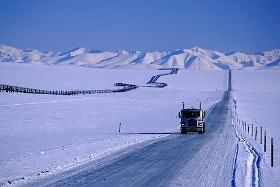How Can You Do That? A Puzzler For New And Future Drivers
Topic 10437 | Page 1

Well, another truck driver (in another Navajo truck) and I drove from a plant in Dunkirk, NY to Walcott, IA in one day.
I estimated 678 miles. It was almost entirely interstate miles.
Dave
Interstate:
Commercial trade, business, movement of goods or money, or transportation from one state to another, regulated by the Federal Department Of Transportation (DOT).

Old School.
When did you get the load assignment?
Where were you when you got the load assignment relative to the SAPA plant?
What was the state of all your clocks when you got the load assignment?
SAP:
Substance Abuse Professional
The Substance Abuse Professional (SAP) is a person who evaluates employees who have violated a DOT drug and alcohol program regulation and makes recommendations concerning education, treatment, follow-up testing, and aftercare.

I have to agree with Michael, It has to be your clocks.
So to go the full 1200 miles at 62 you need 19.5 hours of driving. From time of pickup to drop off you had 34 hours.
Now, how did you do it is tougher. I'm guessing you didn't start your clock on Saturday at 2100, or else you wouldn't have posed this question as you would have been fine. In order to drive 769 you had to drive for 12.5 hours, then the remaining 431 in 7 hours. I'm guessing it had something to do with split berth logging or getting hours back when day 1 drops off of your 8/70?
You could only have had one 10 hour down time or it wouldn't have happened. I admit I get a bit confused with split berth and returned hours. I'll be interested to see how you did it, if it wasn't a straightforward starting of your clock at 2100 :)
Dm:
Dispatcher, Fleet Manager, Driver Manager
The primary person a driver communicates with at his/her company. A dispatcher can play many roles, depending on the company's structure. Dispatchers may assign freight, file requests for home time, relay messages between the driver and management, inform customer service of any delays, change appointment times, and report information to the load planners.Ah! Great questions Michael!
I finished a 34 hour reset earlier in the day Saturday, I'm parked close enough to the plant so that I don't have to start my clock to get there, and the load assignment was given to me on Friday evening, but they did not realize it would be so late to get loaded at that time.
All of that, except maybe when I got the assignment are all pieces to this puzzle.
I'm starting with a fresh seventy hour clock.

Ah! Great questions Michael!
I finished a 34 hour reset earlier in the day Saturday, I'm parked close enough to the plant so that I don't have to start my clock to get there, and the load assignment was given to me on Friday evening, but they did not realize it would be so late to get loaded at that time.
All of that, except maybe when I got the assignment are all pieces to this puzzle.
I'm starting with a fresh seventy hour clock.
So with that info I'm guessing you were able to stay in Sleeper Berth for an additional 8 hours after your reset thus pushing your 14 hour start time until after you were loaded? Then it was a 11 hours from say 2200 - 0930, take a 10, start back at 2000 on Sunday and get to your destination at 03-0330? I think my math works. Again just not sure if I have used the 8 hour sleeper berth rule correctly.
Sleeper Berth:
The portion of the tractor behind the seats which acts as the "living space" for the driver. It generally contains a bed (or bunk beds), cabinets, lights, temperature control knobs, and 12 volt plugs for power.
I love these type of threads. I'll shut up and not give away the answer to let the folks figure it out!



I love these type of threads. I'll shut up and not give away the answer to let the folks figure it out!
I'm glad you like it. I don't have any hair and I'm trying to pull it out waiting for the answer.


I love these type of threads. I'll shut up and not give away the answer to let the folks figure it out!
I'm glad you like it. I don't have any hair and I'm trying to pull it out waiting for the answer.
Same here! Brain teasers always suck me right in.

You started your 14 hour clock at 2100 Saturday, drove 6 hours to 0300, took a 30 minute break, then drove from 0330 for 5 hours until 0830, then commenced your 10 hours off duty break (there's no 8 hour sleeper rule FYI). So now at 1830 you do you required PTI in 15 while fueling and off you go for 6 more hours until 0030 now Monday morning, take your 30 minute break and rock out the rest from 0100 until 0600 which traveling at 62 mph the whole leaves you 164 miles to spare! Now tell me I'm wrong 
New Reply:
New! Check out our help videos for a better understanding of our forum features

















Preview:
This topic has the following tags:
Advice For New Truck Drivers Hours Of Service Logbook Questions Split Sleeper Berth Rule Trip Planning Truck Driving Lifestyle







 TT On Facebook
TT On Facebook
Recently one of our fairly new members posed a hypothetical situation concerning Hours of Service (HOS) rules. As the discussion developed it became obvious that many folks in the discussion didn't really understand what the limitations of the 14 hour and 70 hour rules were. You can still be "on duty" after you have reached both of those limitations, but many don't seem to understand that. You can't drive once you've reached those points, but you can still be on duty and working without violating any rules.
I want to put a plug in for all of you who are contemplating this career or those who are already budding young rookies in their very first truck - Please take the extra time to go through the logs section of the High Road Training Program - the time you spend in there will help you tremendously as you begin your new career. I mean really study it, and try to comprehend it. For me, that section alone meant almost an extra 10 grand on my rookie year salary - I'm serious - grasping the nuances of how I could control my own destiny because I understood how the rules worked, kept me from being a slave to the clock. I was it's master, and my dispatcher was constantly amazed at how much I could accomplish.
The dispatcher I work with now still compliments me all the time on my clock management, and has several times asked me if I could teach a class some day for the other guys in our fleet. I tip my hat to Brett for that section of the High Road, it was like a revelation to me once I laid hold of the concepts in there.
Now here's a little quiz for your entertainment and hopefully for your education as well. Saturday of this week I was given a 1200 mile load that had to be delivered first thing (0700) Monday morning. That doesn't sound so bad until you find out they don't have the load ready until 2100 (9:00 PM Saturday night). My dispatcher was apologizing profusely to me and saying that the SAPA plant was having a log jam in the shipping department. He said "I know it can't be done, but just do the best you can and I will call the customer and let them know that it is not your fault." My response was "there's no need for you to call them and make us look bad, I'll be there Monday morning before they have even gotten to work." He exclaimed "it can't be done - your truck is governed at 62, and you really only have one day to drive (Sunday) - I don't want you to do anything illegal just to help us save face."
I did get there Monday morning before they started showing up, and on top of that I drove 769 miles on Sunday (legally in my governed truck).
Can you see the path to making a load like this happen on time? Please jump in here with your solutions - it's not to put any one on the spot, it's going to be a fun and educational guessing game. This is for the newbies, the rookies, and the wanna be's - give it your best shot!
Experienced drivers, please let the new guys and gals take a stab at this one - I'll provide the solution in a few days with some pictures of my electronic log screens to show you how to work this kind of magic.
CDL:
Commercial Driver's License (CDL)
A CDL is required to drive any of the following vehicles:
SAP:
Substance Abuse Professional
The Substance Abuse Professional (SAP) is a person who evaluates employees who have violated a DOT drug and alcohol program regulation and makes recommendations concerning education, treatment, follow-up testing, and aftercare.
Dispatcher:
Dispatcher, Fleet Manager, Driver Manager
The primary person a driver communicates with at his/her company. A dispatcher can play many roles, depending on the company's structure. Dispatchers may assign freight, file requests for home time, relay messages between the driver and management, inform customer service of any delays, change appointment times, and report information to the load planners.HOS:
Hours Of Service
HOS refers to the logbook hours of service regulations.OWI:
Operating While Intoxicated